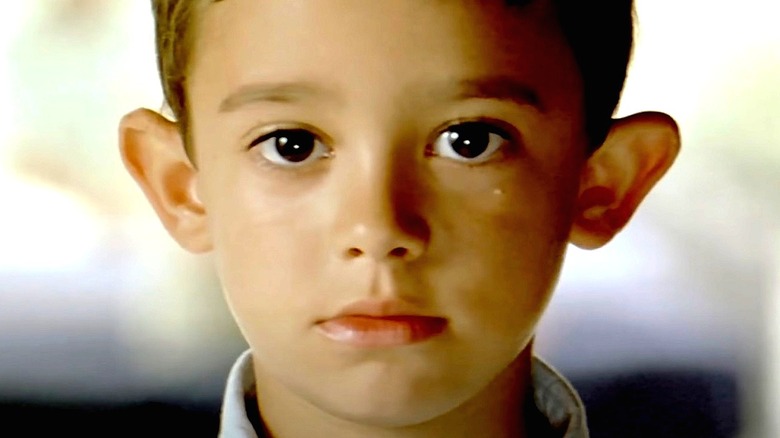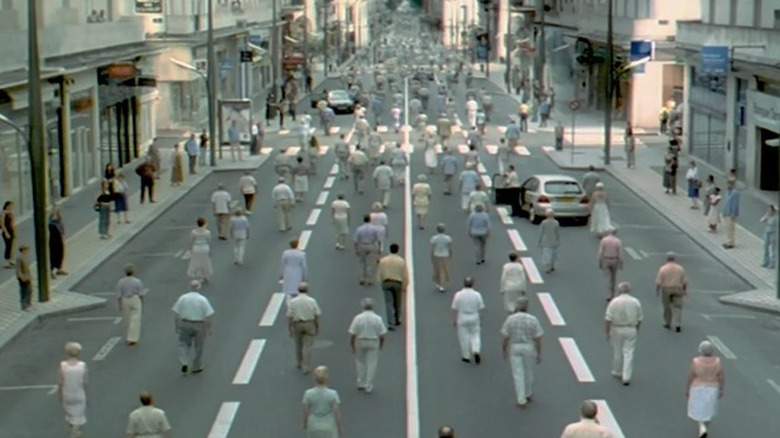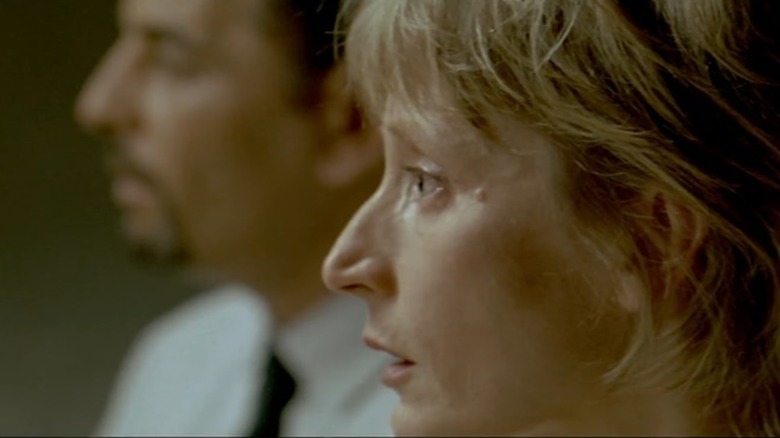The Ending Of They Came Back Explained
There's simply a massive abundance of shows, films, and video games in the zombie genre. Thanks to juggernaut franchises such as "The Walking Dead" and "Resident Evil," placing survivors in a zombie no man's land setting is pretty big business. That being said, with such a wave of zombie fare and little evidence of it ever slowing down, it can seem a little tricky to find any media that is different from the typical undead crowd. The French film "They Came Back" was ahead of the game in 2004 when it debuted and has long shown how a zombie flick can be unique.
Directed by Robin Campillo, the story centers on 70 million people worldwide who previously died but suddenly came back to life. Also known as the Returned, 13,000 come back to a small French town. For the most part, the Returned function like normal humans, except during the day, their minds are a bit more limited than when they were initially alive, and they also have a habit of wandering around at night. "They Came Back" proved popular enough to spawn a French TV series and an American one produced by A&E (via Variety). Given its original concept on the undead genre, it's easy to see why. But what was the meaning behind the strange ending of the original film? Ponder no more as we unravel the film's themes on death and grief.
They Came Back presents the undead as a living epidemic
Media depicting the undead often focuses on how the surviving world reacts and continues to live among zombies. Often the conflict presented in George Romero's "Night Of The Living Dead" and AMC's "The Walking Dead" is a violent affair, as the undead are direct and dangerous threats to the living. "They Came Back" presents this undead concept in a different light, where instead, the undead or the Returned are not ravenous brain-craving beasts. They are a sudden mass of people who prove to be a logistical and socio-political nightmare due to their sudden appearance.
We see the French town struggle with this problem in various ways in "They Came Back," such as housing the Returned in a community center, having them work menial jobs, and generally helping them to reintegrate back into society. When they set off explosions in the town during the conclusive arc of the film, the next logical solution comes from the military becoming involved. Fortunately, they only knock out the undead and move their bodies on top of their graves for them to ultimately vanish. Whether the decision is wise or unwise, the military involvement is yet another example of how the town and perhaps the world choose to deal with a sudden epidemic of the Returned without the breakdown of society as we know it today.
They Came Back is also about how we process the loss of a loved one
"They Came Back" doesn't just focus on the socio-political problems that having a mass of functioning undead could cause. The film's ending emphasizes the central theme of how we choose to accept the death of a loved one and grieve. During the conclusion, the Returned all try to walk away at night, go into a tunnel, and disappear into the afterlife. Yet, through three sets of characters during this ending, we see the varied reactions to this phenomenon.
The Mayor (Victor Garrivier) finds his returned wife Martha (Catherine Samie), and although he tries to take her back home, he ultimately chooses to join her in death. Six-year-old, returned Sylvain (Saady Delas) spends much of the film at night clawing to get out of his home and finally does by the ending despite his parents Isham (Djemel Barek) and Véronique (Marie Matheron) declaring that they will never lose him again. And Mathieu (Jonathan Zaccaï) finally details what happened on the night of his fatal crash to his wife, Rachel (Géraldine Pailhas), before leaving her forever. With the Mayor, we witness an acceptance of not only a loved one's death but also his own. Meanwhile, Sylvain's parents represent denial, as they can't let go of their son. And finally, Rachel gets closure and a proper chance to say goodbye to Mathieu. It's arguable that if "They Came Back" would have focused on more characters, we could have received a complete look at the five emotional stages of grief ( via Merck Manual), as the movie's plot and ending focus on a few aspects.


